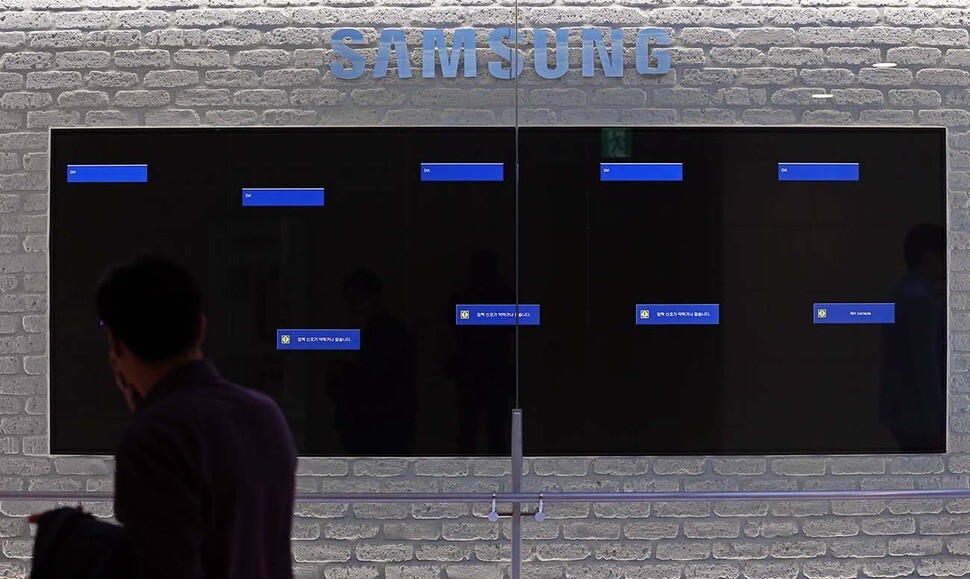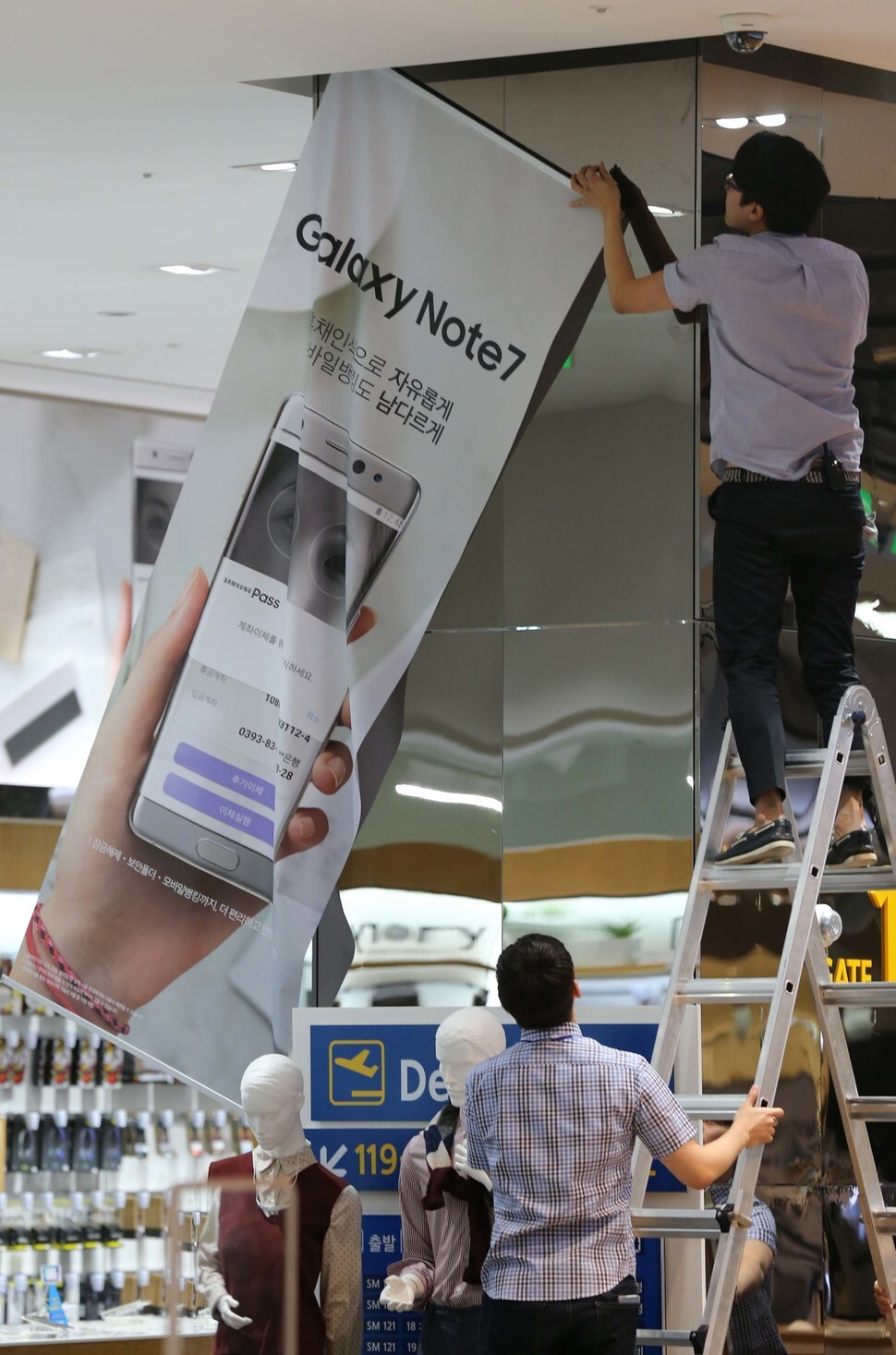hankyoreh
Links to other country sites 다른 나라 사이트 링크
[Analysis] Galaxy 7 boondoggle a symptom of Samsung’s corporate flaws

The Galaxy Note 7 crisis at Samsung Electronics may not simply a matter of a malfunctioning product, but can instead be ultimately attributed to a crisis of confidence resulting from a lack of transparency and to the company’s inflexible corporate governance structure.
In early September, Samsung Electronics announced that it would carry out a voluntary recall, with company president Koh Dong-jin coming forward to declare that the fires were caused by defective batteries. In mid-September, the company started replacing the phones that were sold with new phones containing different batteries, and on Oct. 1, it resumed ordinary sales.
But some of the newly replaced phones caught fire as well, prompting suspicions that the accidents were not simply due to faulty batteries. On Oct. 11, an executive at Samsung Electronics was unable to offer a clear explanation. “We replaced the phones after concluding that there was a problem with the batteries, so we were caught by surprise when the fires occurred again. We‘re currently investigating the causes of the fires simultaneously in South Korea, the US and Taiwan,” the executive said.

While Samsung announced that a faulty battery was to blame for Galaxy Note 7 phones catching on fire, this claim had not been definitively proven. Nor had the government, which is responsible for consumer safety issues, officially confirmed the claim. After fires occurred in the new phones, the medias raised the possibility of a problem with the Galaxy Note 7 itself or with its software, but this too is merely conjecture.
“What is even more necessary for consumer safety than a recall is transparently disclosing the exact cause of the accident. The only way that consumers will feel comfortable using [Samsung products] is for the company to transparently disclose whether this was a simple technical flaw or whether there was some other factor, who was responsible and what follow-up measures have been taken,” said Lee Sang-hak, a permanent director of the South Korean chapter of Transparency International.
Even when US regulators recommended and then ordered consumers to stop using the phone after the recall, Samsung was consistently slow to take action, doing little more than making announcements that repeated the regulators’ words.
The biggest problem was that Samsung did not transparently provide information about the safety of the new product. If Samsung had focused more on determining the cause of the accident than on minimizing its losses by swiftly resuming sales of the phone, it may well have been able to prevent the second round of fires from occurring. If Samsung had not been 100% confident of the safety of the new phone, it would not have hastily decided to exchange the old phones for the new ones or to resume sales.
“Corporate transparency is quickly becoming established as a global standard for preventing corruption and for increasing corporate competitiveness,” said Transparency International Business Advisory Board Chair Jermyn Brooks during a seminar held in Seoul on Oct. 6. Participants in the seminar agreed that South Korean companies’ competitiveness depended not only on competitive products but also on earning consumers’ trust, and that the key to earning trust was to achieve transparency.
Another likely cause of this crisis is the button-down corporate governance structure at Samsung, in which employees uncritically carry out orders from the top. After getting wind of the fact that Apple‘s new phone, the iPhone 7, would not offer any major innovations, the Samsung Future Strategy Office decided to get a head start by releasing the Galaxy Note 7 one month before the iPhone 7 and to take a solid lead in the market by launching the Galaxy 8 in the spring of 2017.
“Since the company had to move according to the strategic schedule decided upon by the Future Strategy Office, the opinions of the departments in charge of producing and testing products were not properly conveyed, and this is where the product defects occurred,” said a source at Samsung Electronics.
“This disaster was the product of Samsung’s inflexible corporate governance structure. Since the recall decision and the new product launch were both unilateral orders made at the top, the company repeated an error that resulted in its phones catching on fire,” said Kim Sang-jo, director of Solidarity for Economic Reform.
By Kwack Jung-soo, business correspondent
Please direct questions or comments to [english@hani.co.kr]

Editorial・opinion
![[Column] Season 2 of special prosecutor probe may be coming to Korea soon [Column] Season 2 of special prosecutor probe may be coming to Korea soon](https://flexible.img.hani.co.kr/flexible/normal/500/300/imgdb/original/2024/0426/3317141030699447.jpg) [Column] Season 2 of special prosecutor probe may be coming to Korea soon
[Column] Season 2 of special prosecutor probe may be coming to Korea soon![[Column] Park Geun-hye déjà vu in Yoon Suk-yeol [Column] Park Geun-hye déjà vu in Yoon Suk-yeol](https://flexible.img.hani.co.kr/flexible/normal/500/300/imgdb/original/2024/0424/651713945113788.jpg) [Column] Park Geun-hye déjà vu in Yoon Suk-yeol
[Column] Park Geun-hye déjà vu in Yoon Suk-yeol- [Editorial] New weight of N. Korea’s nuclear threats makes dialogue all the more urgent
- [Guest essay] The real reason Korea’s new right wants to dub Rhee a founding father
- [Column] ‘Choson’: Is it time we start referring to N. Korea in its own terms?
- [Editorial] Japan’s rewriting of history with Korea has gone too far
- [Column] The president’s questionable capacity for dialogue
- [Column] Are chaebol firms just pizza pies for families to divvy up as they please?
- [Column] Has Korea, too, crossed the Rubicon on China?
- [Correspondent’s column] In Japan’s alliance with US, echoes of its past alliances with UK
Most viewed articles
- 1No good, very bad game for Korea puts it out of Olympics for first time since 1988
- 2[Column] Season 2 of special prosecutor probe may be coming to Korea soon
- 3Korea’s 1.3% growth in Q1 signals ‘textbook’ return to growth, says government
- 4‘We must say no’: Seoul defense chief on Korean, USFK involvement in hypothetical Taiwan crisis
- 5Is N. Korea threatening to test nukes in response to possible new US-led sanctions body?
- 6Division commander ordered troops to enter raging flood waters before Marine died, survivor says
- 7[Column] ‘Choson’: Is it time we start referring to N. Korea in its own terms?
- 8Will NewJeans end up collateral damage in internal feud at K-pop juggernaut Hybe?
- 9Korea sees more deaths than births for 52nd consecutive month in February
- 10[Editorial] Korea’s surprise Q1 growth requires objective assessment, not blind fanfare